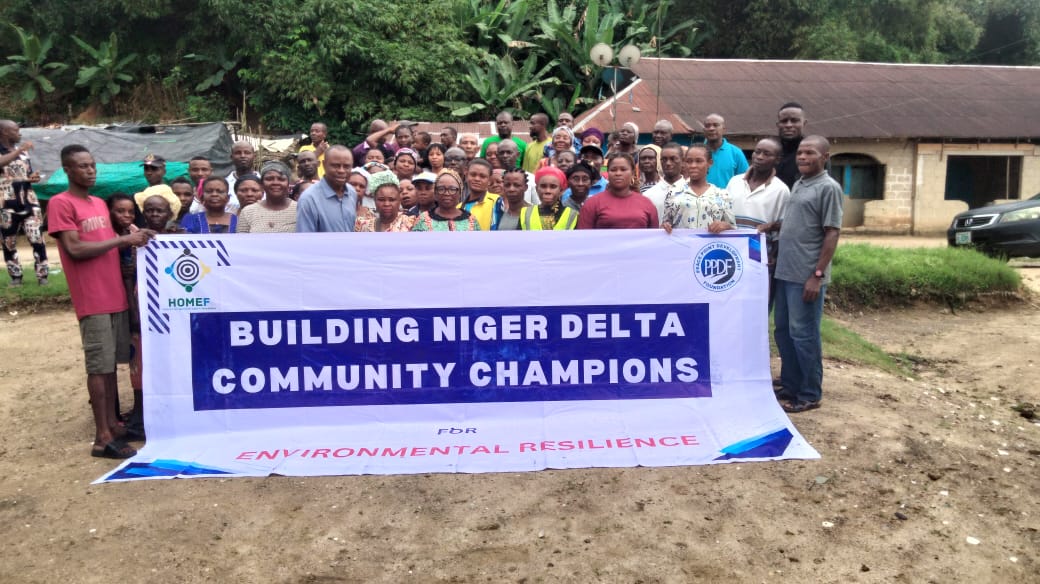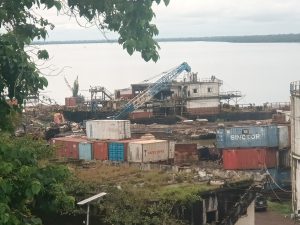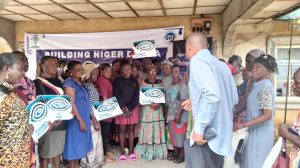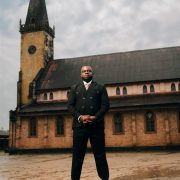PPDF, HOMEF Unite Fisherfolk in Cross River to Defend Their Waters, Livelihoods

By Unyime Okon
At the palace of Eserebom Community Village Head in Calabar, Cross River State, the voices of fisher men and women echoed across the river which banks the community. For generations, this river has been their source of food, income, and pride.
But this is gradually becoming history and the community will not accept it. They are rising to defend their water, their life.
On Wednesday, November 5, 2025, Eserebom came alive with renewed hope and determination as Peace Point Development Foundation (PPDF), in partnership with the Health of Mother Earth Foundation (HOMEF), held a capacity-building workshop to strengthen the ability of local fisherfolk to protect their environment and livelihoods from pollution and destructive industrial activities.
The gathering, themed ” Building Niger Delta Community Champions” trained the community on environmental advocacy, grassroots organising, and sustainable alternatives as part of an ongoing effort to strengthen coastal communities especially fishing communities in the Niger Delta with knowledge and networks to champion environmental justice.
Our Waters Are Dying — Fisherfolk Cry Out
For the fishers of Eserebom, the environmental crisis is not far away. it is at their doorsteps. “The Chinese Ship Dismantling company operating by our river has made fishing a difficult task,” lamented Efefiong Effiong, a fisherman with over 20 years of experience. “They discharge oil into the waters. When we go fishing, we see thick oil floating. No fish can survive there. Sometimes, we travel very far just to catch a few, but the oil spreads wide. They also burn plastics there, and the fumes disturb us.”

His words painted a picture of a once lively ecosystem now suffocating under the weight of industrial pollution.
Another fisherman, Emmanuel Okon said the sand dredging taking place in the river has also polluted the water and pushed fishes far off. He however noted that the training opened their eyes to new possibilities. “This workshop has exposed us to how we can push for our environmental rights. We face challenges that discourage us, but now we know what to do to correct them. We can no longer remain silent.”

We Will Fish Responsibly — Traditional Ruler Pledges Action
The Village Head of Eserebom, Her Highness, Obonganwan Elizabeth Akami-eyo, was visibly elated.
“I am very happy. My community members are happy too over this timely exposure. May the Lord bless Peace Point and HOMEF. I was touched when we were taught not to cut down our mangroves, because they protect our fish and our land.”
But she assures that action will follow. “We will mobilise our people to engage with the government and demand implementation of regulations to make our waters safe. When there is no fish, it will affect everyone including our politicians. On our part, we will fish responsibly and protect our environment.”
The Fishers Struggles and the National Vision
The Coordinator of Peace Point Development Foundation (PPDF), Umo Isua-Ikoh, in his presentation on “Understanding Environmental and Climate Justice: Niger Delta Alternatives Convergence (NDAC) and the Nigeria Socio-Ecological Alternatives Charter”, told the participants that Eserebom’s story is part of a broader national struggle.
“The NDAC is a coming together of community people, activists, fishers, farmers, women, and youth who are saying ‘Enough is enough!’ Development should not destroy our environment. The oil and gas companies must clean up the mess they created. Government must invest in renewable energy like solar that benefits our people.”
He said that the Nigeria Socio-Ecological Alternatives Charter is a people’s agreement and a guide for how Nigerians can live in balance with nature and with one another.
“It promotes sustainable livelihoods like fishing and farming that protect the environment; community control of natural resources; gender inclusion; and restoring mangroves, rivers, and forests,” Isua-Ikoh said.
“Here in Calabar, families are struggling with pollution, mangrove loss, and declining fish stocks. This Charter is our roadmap for change, one that puts people and planet before profit.”
While calling on the fishers to be united, the PPDF coordinator recommended that if the people need their livelihoods back, they must begin to demand that the government protects their waters, that no one dumps waste in their creeks and river, that women’s voices are heard in environmental planning and that development should respect both people and nature.
Call to Build Strength in Unity
In his own session on “Grassroots Organising and Advocacy for Environmental Justice,” the Director of Quality Control at the Cross River State Ministry of Environment, Mr. Agba Agbor, called on participants to unite for change.
“Grassroots organising means coming together, finding a common voice, and standing together in peaceful advocacy. One rope alone is weak, but when many ropes are tied together, they form a strong fishing net. One rope alone is weak, but when many ropes are tied together, it can catch big fish. That is how we must stand united.”
Agbor asked the community to join the FishNet Alliance, a regional movement of fishers across Nigeria and West Africa who say “No to harmful fishing and pollution!” and promote clean waters and justice for coastal people.
Telling Their Stories for Change
Environmental activist Ekemini Simon who spoke on “Communication, Storytelling and Sustainable Alternatives for Change.” said the suffering faced by fishers is as a result of environmental pollution.
You are the ones who live by the water. The water feeds us, sends your children to school, and gives us pride,” he said. “But today, our water is crying. The fish are fewer, the mangroves are dying, and our health is suffering. We must use our voices, our stories, and our unity to bring change.”
He called on fisherfolk to tell their own stories and not to wait for outsiders to speak for them.
The environmental activist said when they tell their stories truthfully as regards what is happening, how it affects them, and what they want changed, they create power and their stories become their tools for action.
Simon who took the community members on practical ways of storytelling encouraged community members to transform their stories into songs, folklores and disseminate it through local radio, market gatherings, church meetings, and even WhatsApp voice notes to share their experiences and solution demands.
He also asked the community to take actions towards protecting their waters by replanting mangroves, organising monthly shoreline cleanups and adopting improved fish smoking ovens that reduce smoke and protect health.
Simon added ” Explore budget cycles and make inputs of your demands in the budget through the relevant Ministries, Department and Agency. Tell your stories too during Budget Public Hearings.
“Make the government understand that you are not against development. However, development must not destroy your water, your mangroves, or your future. When you take care of the water, you take care of your lives. Your voice is strong, your stories are true, and your unity is your power.”
A New Tide Rising
As the training ended, the people of Eserebom did not leave with empty hands. They left with a renewed spirit, a shared understanding that their environment is not just their workplace but their life. This made them voluntarily join the FishNet Alliance in order to collaborate with other fishers across the Niger Delta region and Africa to see how their fishing environment can be protected.

FishNet Alliance inaugurated
With the support of Peace Point Development Foundation and Health of Mother Earth Foundation, a new tide of environmental consciousness is rising among Cross River’s fishing communities.
The fishers of Eserebom are no longer silent victims of pollution. They are now storytellers, advocates, and defenders who are poised to stand firm to protect their waters, their mangroves, and their future.







